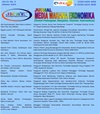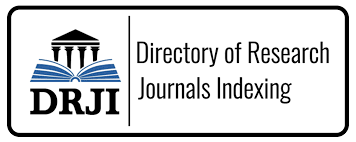Menggali Hubungan Kecerdasan Emosional, Kecerdasan Spiritual dan Keputusan Investasi
DOI:
https://doi.org/10.31851/jmwe.v21i3.14808Keywords:
Kecerdasan Emosional, Kecerdasan Spiritual, Keputusan Investasi, Pengambilan Keputusan, Psikologi InvestasAbstract
Kecerdasan emosional dan spiritual dapat memengaruhi cara individu membuat keputusan, termasuk didalam konteks investasi. Dalam konteks investasi, penelitian ini mengksplorasi bagaimana kedua jenis kecerdasan ini memengaruhi proses pengambilan keputusan. Secara hipotesis dapat dikatakan bahwa investor dengan tingkat kecerdasan emosional dan spiritual lebih tinggi akan membuat keputusan investasi yang lebih baik dibandingkan dengan mereka yang memiliki tingkat kecerdasan emosional dan spiritual yang lebih rendah. Penelitian ini bertujuan untuk menggali hubungan antara kecerdasan emosional, kecerdasan spiritual dan keputusan investasi. Populasi dalam penelitian ini adalah generasi milenial di Kota Pontianak dan teknik pengambilan sampel menggunkan metode purposive sampling didapatkan jumlah sampel sebanyak 283 responden. Teknik analisis data menggunakan regresi linier berganda dengan alat analisis smartPLS 3.0. Hasil penelitian ini mengemukakan bahawa kecerdasan emosional dan kecerdasan spiritual memiliki pengaruh positif dan signifikan terhadap keputusan investasi. Dapat disimpulkan dari berbagai faktor yang dapat mempengaruhi keputusan investasi seseorang, didapatkan sebesar 59,9% dipengaruhi oleh kecerdasan emosional dan kecerdasan spiritual.
References
Azzet, A. M. (2010). Mengembangkan kecerdasan spiritual bagi anak (M. Sandra (ed.)). Kata Hati.
Brown, C., George-Curran, R., & Smith, M. L. (2003). The Role of Emotional Intelligence in the Career Commitment and Decision-Making Process. Journal of Career Assessment, 11(4), 379–392. https://doi.org/10.1177/1069072703255834
Carmeli, A. (2003). The relationship between emotional intelligence and work attitudes, behavior and outcomes: An examination among senior managers. In Journal of Managerial Psychology (Vol. 18, Issues 7–8). https://doi.org/10.1108/02683940310511881
Ciarrochi, J., Forgas, J. P., & Mayer, J. D. (2001). Emotional Intelligence in Everyday Life: A Scientific Inquiry. Psychology Press.
Cobb, C. D., & Mayer, J. D. (2000). Emotional intelligence. Educational Leadership, 58(3), 14–18. https://doi.org/10.2190/dugg-p24e-52wk-6cdg
Côté, S., & Miners, C. T. H. (2006). Emotional Intelligence, Cognitive Intelligence, and Job Performance. Administrative Science Quarterly, 51(1), 1–28. https://doi.org/10.2189/asqu.51.1.1
Dua, Y. S. (2015). Emotional Intelligence of Entrepreneurs and their Decision-making Style: Role of Vision. Jindal Journal of Business Research, 4(1–2), 101–114. https://doi.org/10.1177/2278682116664608
Faridawati, R., & Silvy, M. (2019). Pengaruh niat berperilaku dan kecerdasan spiritual terhadap pengelolaan keuangan keluarga. Journal of Business & Banking, 7(1). https://doi.org/10.14414/jbb.v7i1.1465
Fazal Hadi. (2017). Effect of Emotional Intelligence on Investment Decision Making With a Moderating Role of Financial Literacy. China-USA Business Review, 16(2), 53–62. https://doi.org/10.17265/1537-1514/2017.02.002
Ghozali, I., & Latan, H. (2015). Partial Least Squares konsep, teknik dan aplikasi menggunakan program smartPLS 3.0 untuk penelitian empiris. Badan Penerbit UNDIP.
Ghozali Imam. (2018). Aplikasi Analisis Multivariate Dengan Program IBM SPSS 25 (Sembilan). In Semarang, Universitas Diponegoro. Universitas Diponegoro.
Goleman, D. (1998). Working With Emotional Intelligence. Bantam Books.
Gusti, G. P., Yuliarto, R. T., Maulana, U. A. I., & Yulia. (2024). Analisis Kinerja Saham Unggulan Tahun 2023 : Kenaikan Luar Biasa Dan Dampaknya Terhadap Rerata Transaksi Harian Di Pasar Saham Indonesia. 7, 32–48.
Hair, J. F., Black, Jr, W. C., Babin, B. J., & Anderson, R. E. (2019). Multivariate Data Analysis. In Pearson New International Edition.
Hayati, N., & Wardhana, M. A. (2022). What Income Level Can Moderate Spiritul Intelligence and Lifestyle Towards Millenial Financial Management Behaviour. Jurnal Bisnis Digital Dan Sistem Informasi, 1–11.
Hu, L. T., & Bentler, P. M. (1999). Cutoff criteria for fit indexes in covariance structure analysis: Conventional criteria versus new alternatives. Structural Equation Modeling, 6(1), 1–55. https://doi.org/10.1080/10705519909540118
Laborde, S., Lautenbach, F., Allen, M. S., Herbert, C., & Achtzehn, S. (2014). The role of trait emotional intelligence in emotion regulation and performance under pressure. Personality and Individual Differences, 57, 43–47. https://doi.org/10.1016/j.paid.2013.09.013
Lam, L. T., & Kirby, S. L. (2002). Is emotional intelligence an advantage? An exploration of the impact of emotional and general intelligence on individual performance. Journal of Social Psychology, 142(1), 133–143. https://doi.org/10.1080/00224540209603891
Lerner, J. S., Li, Y., Valdesolo, P., & Kassam, K. S. (2015). Emotion and decision making. Annual Review of Psychology, 66(September 2014), 799–823. https://doi.org/10.1146/annurev-psych-010213-115043
Manafe, J. (2021). The Effect of Financial Knowledge, Financial Experience and Spiritual Intelligence on Investment Planning Behavior. Jurnal Ekonomi & Bisnis JAGADITHA, 8(2), 209–214. https://doi.org/10.22225/jj.8.2.2021.209-214
Maulana, U. A. I. (2023). Pengaruh Ukuran Perusahaan, Profitabilitas dan Leverage Terhadap Nilai Perusahaan. E-Journal Equilibrium Manajemen, 9(1), 88–97.
Mayer, J. D., & Salovey, P. (1993). The intelligence of emotional intelligence. Intelligence, 17(4), 433–442. https://doi.org/10.1016/0160-2896(93)90010-3
Muliartini, N. W., & Jati, I. K. (2019). Pengaruh Kecerdasan Intelektual, Kecerdasan Emosional, Kecerdasan Spiritual, dan Faktor Situasional Pada Keputusan Etis Konsultan Pajak. E-Jurnal Akuntansi, 28(3), 1866. https://doi.org/10.24843/eja.2019.v28.i03.p15
Mulvey, J. M., & Vladimirou, H. (1989). Stochastic network optimization models for investment planning. Annals of Operations Research, 20(1), 187–217. https://doi.org/10.1007/BF02216929
Muttath, B. T., & Menachery, A. (2018). Impact of Emotional Intelligence on Investment Decisions. Journal of Management Research and Analysis, 5(01), 255–260.
O-Creevy, M. F., Soane, E., Nicholson, N., & Willman, P. (2010). Thinking, feeling and deciding: The influence of emotions on the decision making and performance of traders. Journal of Organizational Behavior, 32(8), 1044–1061. https://doi.org/doi.org/10.1002/job.720
Pratiwi, F. M., & Puspawati, D. (2022). Factors Influencing Millennial Generation Investment Decisions: Focus on Investment Behaviour. Procedia of Social Sciences and Humanities, 3(c), 19–27. https://doi.org/10.21070/pssh.v3i.198
Puffer, K. A. (2011). Emotional intelligence as a salient predictor for collegians’ career decision making. Journal of Career Assessment, 19(2), 130–150. https://doi.org/10.1177/1069072710385545
Putka, D. J., & Sackett, P. R. (2010). Realibility and Validity. Taylor and Francis.
Sari, P. R. K., Ananda, N. A., & Nuwailah. (2020). Spiritual Intelligence and Financial Experience on Personal Investment Muslim Scholar. Islamic Banking, Accounting and Finance International Conference (IBAF) 2020.
Sekaran, U., & Bougie, R. (2020). Research Methods For Business : A Skill Building Approach (8th (Asia). Hoboken: Wiley.
Seo, M. G., & Barrett, L. F. (2007). Being emotional during decision making - Good or bad? An empirical investigation. Academy of Management Journal, 50(4), 923–940. https://doi.org/10.5465/amj.2007.26279217
Sina, P. G., & Noya, A. (2009). Pengaruh Kecerdasan Spiritual Terhadap Pengelolaan Keuangan Pribadi. Pengaruh Kecerdasaan Spirtual Terhadap Pengelolaan Keuanagan Pribadi, 11(2), 171–188.
Slovic, P. (1972). PSYCHOLOGICAL STUDY OF HUMAN JUDGMENT: IMPLICATIONS FOR INVESTMENT DECISION MAKING. Journal of Finance, 27(4), 779. https://doi.org/doi.org/10.2307/2978668
Sugiyono. (2021). Metode Penelitian Kuantitatif, Kualitatif, dan R&D (3rd ed.). Alfabeta.
Vaughan, F. (2002). What is spiritual intelligence? Journal of Humanistic Psychology, 42(2), 16–33. https://doi.org/10.1177/0022167802422003
Zalviwan, M., Haryono, T., & Sawitri, H. S. R. (2020). Investors psychology on the biased investment decision: The mediating effect of extra-motivation to invest. Jurnal Keuangan Dan Perbankan, 24(4), 506–519. https://doi.org/10.26905/jkdp.v24i4.4837
Zohar, D., & Marshall, I. (2000). SQ: Connecting with our Spiritual Intelligence. Bloomsbury.
Downloads
Published
Issue
Section
License
Copyright (c) 2024 Jurnal Media Wahana Ekonomika

This work is licensed under a Creative Commons Attribution-NonCommercial 4.0 International License.
The copyright of the received article shall be assigned to the publisher of the journal licensed under a Creative Commons Attribution-NonCommercial 4.0 International License in line with the license, authors and any users (readers and other researchers) are allowed to share and adapt the material only for non-commercial purposes. In addition, the material must be given appropriate credit, provided with a link to the license, and indicated if changes were made. If authors remix, transform or build upon the material, authors must distribute their contributions under the same license as the original.























